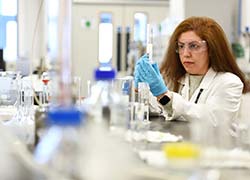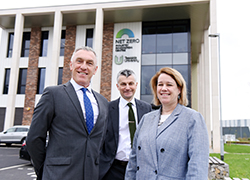Pioneering postgraduate study goes online
Radiographers are experiencing an innovative new way of teaching which is being pioneered at Teesside University.
Postgraduate study in forensic radiography at the University has in the past involved an element of distance learning, largely through emails, podcasts, and related e-communications. But in a bold new step, Teesside University is delivering the PgCert Forensic Radiography using a completely online environment.
Lecturers can now connect with students based anywhere in the world for online presentations, lectures, workshops and discussions.
The University approached Middlesbrough based web conferencing communications and online learning specialists Mizaru to help provide an innovative solution. And now a group of radiographers based across the world are the first to embark on Teesside University’s first totally online PgCert Forensic Radiography.
Jacquie Vallis, Senior Lecturer in Medical Imaging, said: 'The main benefit of the programme being completely online is the financial saving it will bring for students. They previously would have needed to visit the University twice during the course, but they will now save on travel and accommodation costs. Plus they don’t have to take time out from their own clinical practice, thus responding to the changing needs of the students and their employers.
'The move away from traditional distance learning also allows the students to work collaboratively and network much more and takes away any feeling of isolation they might have felt during the course.'
She added: 'The students are interacting well and are really excited about it, as it’s bringing them in touch with a diverse range of students. They can now completely interact with the other students, which wasn’t always possible with more traditional distance learning.'
Some of the students previously completed undergraduate programmes at Teesside, while others are international students new to the University.
Emma Bradburn, Learning Technologist in the University’s Department for Learning Development, said: 'It’s very flexible, as practically everything that you would do in the classroom or lecture theatre you can do through this programme. The students can refer back to past sessions, talk to each other through instant messaging and follow discussions between the lecturer and other students.'
Mike Greig, operations director at Mizaru, said: 'We’re using web conferencing technology which we’ve developed with bespoke components specifically tailored to deliver this course and to enhance the student experience. It’s going beyond the traditional use of web conferencing to make it much more exciting.'
Jacquie added: 'We’re looking at having a session streamed live from the University’s mock courtroom to provide a virtual experience of giving evidence as a forensic radiographer. This would really give the students a feel of what it would be like to be in a courtroom and enable them to see first-hand the environment in which they would give evidence as part of their job.
'It’s about enhancing the programme which was already there and responding to employers and students’ needs. As the course involves speakers such as coroners and pathologists we no longer are constrained by any distance involved in inviting them to speak to our students. They can deliver a session from wherever they are based. It will open up who we can invite to speak and enable us to invite more international speakers and key people in their particular fields.
'It will also make the course much more accessible to radiographers both in this country and overseas. It is really dynamic and interactive.'
Jacquie added: 'Having a wider range of international students will be interesting when looking at issues such as death, as different cultures will have different ways of dealing with this issue, so it’s not just the UK experience which the students will be sharing.'
 Supporting Nigerian farmers by transforming food waste into
...
Supporting Nigerian farmers by transforming food waste into
... International partnership signed with prestigious American
...
International partnership signed with prestigious American
... Teesside University academics join prestigious network of
...
Teesside University academics join prestigious network of
...